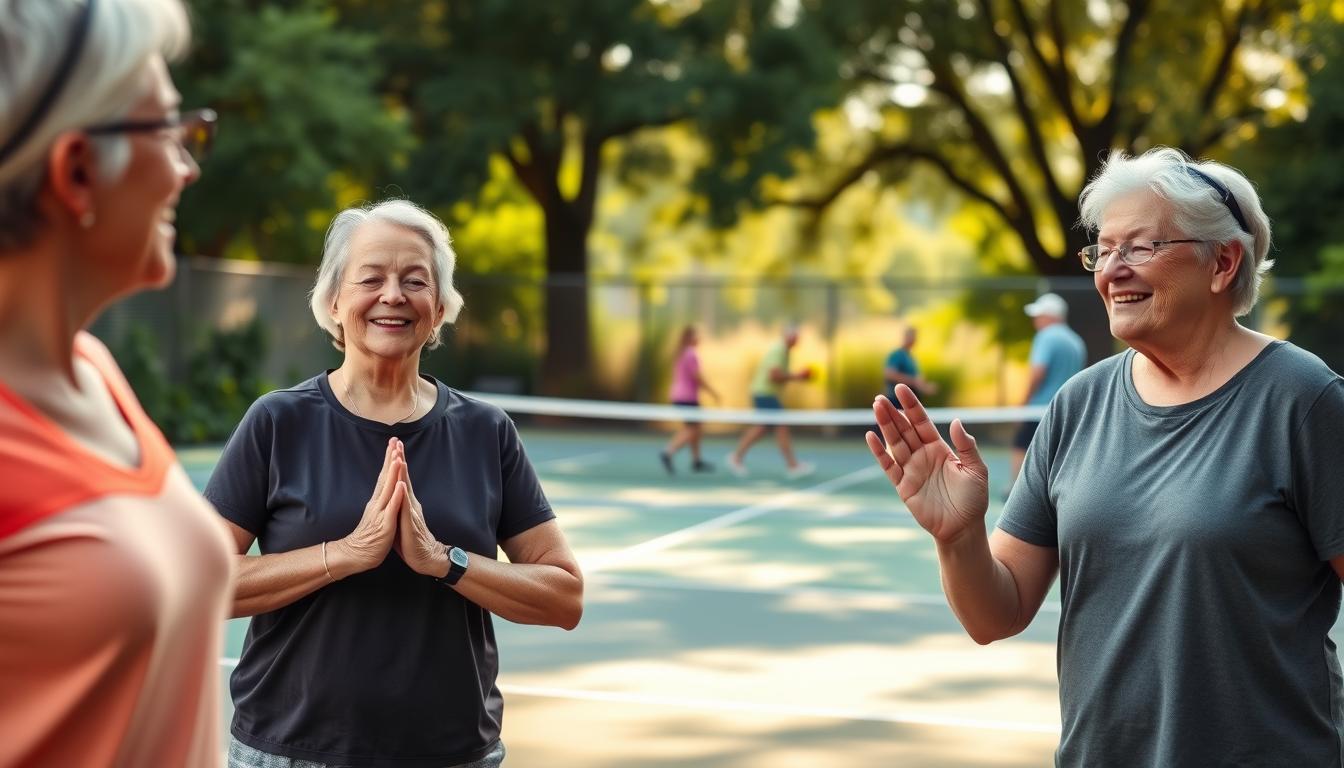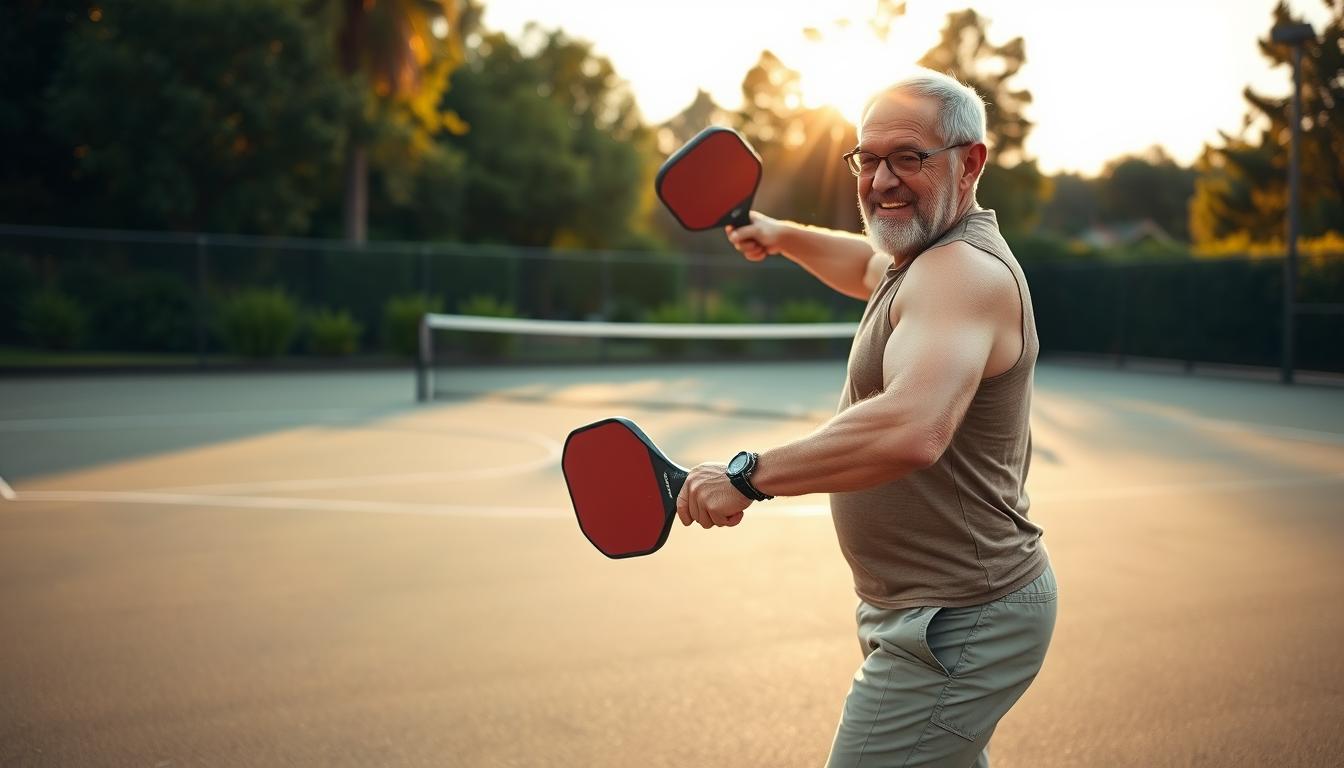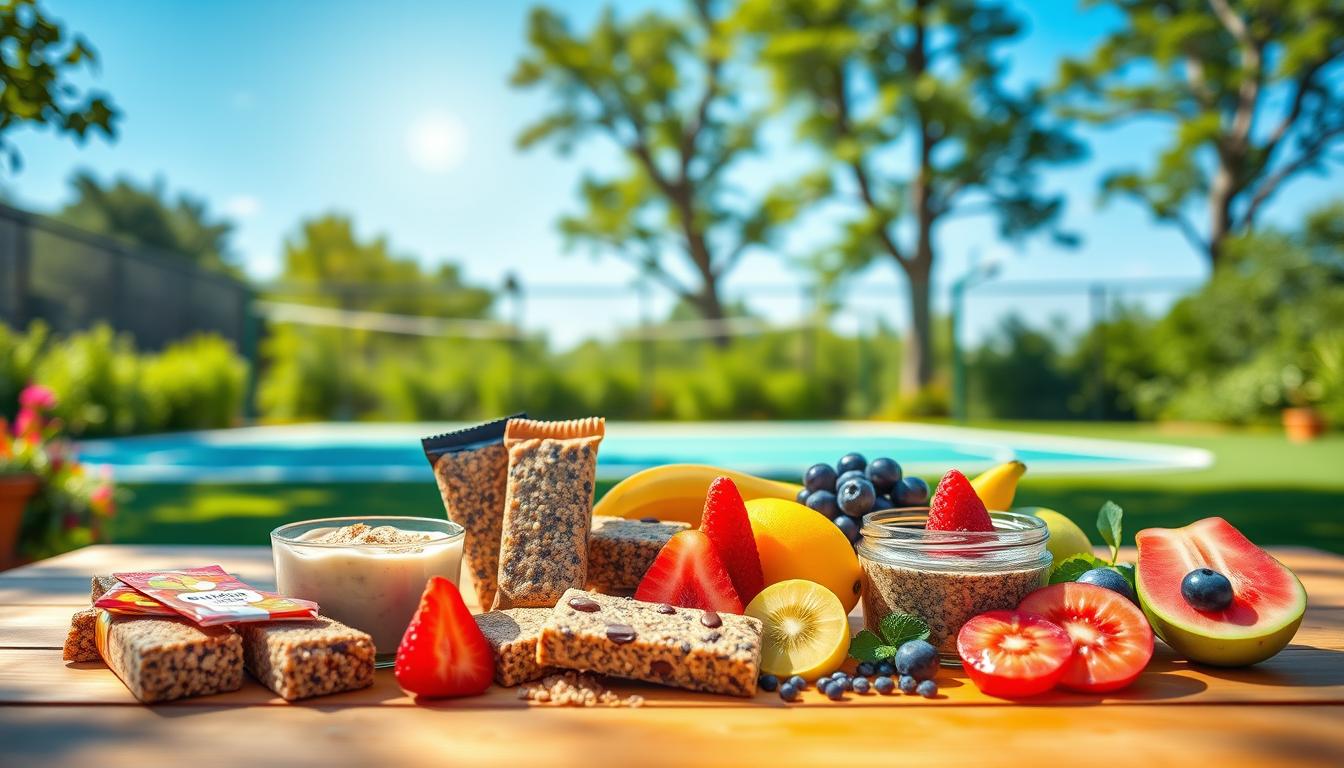Ever wondered why some athletes get cramps while others don’t? For vegan pickleball players, knowing how nutrition affects muscles is key. Muscle cramps are common, often due to not enough water or nutrients. Luckily, adding natural remedies to your diet can help ease muscle pain and boost your health.
This section will show you how vegan nutrition can fight cramps and make you a better player.
The Importance of Nutrition for Vegan Pickleball Players
Nutrition is key for vegan pickleball players. Knowing what to eat is vital for better performance. A balanced diet gives the body the energy and nutrients it needs to play well.
Carbs are important for quick energy during games. They should be a big part of a vegan athlete’s diet. Good sources are whole grains, fruits, and starchy veggies. Proteins help muscles heal and grow, so they’re crucial too. Legumes, nuts, tofu, and seitan are great vegan protein sources.
Healthy fats keep energy up during long games. Avocados, olive oil, and nuts are good sources. Eating at the right times can also improve performance. Eating a variety of foods ensures athletes get all the vitamins and minerals they need.
Planning meals is important for a good pickleball diet. A well-planned diet helps meet nutritional needs, keeping energy up and recovery quick. The right mix of carbs, proteins, and fats tailored to your training can improve your game.
| Nutritional Component | Importance | Sources |
|---|---|---|
| Carbohydrates | Energy for high-intensity play | Whole grains, fruits, starchy vegetables |
| Proteins | Muscle repair and recovery | Legumes, nuts, tofu, seitan |
| Fats | Sustained energy | Avocados, olive oil, nuts |
Understanding Muscle Cramps in Athletes
Muscle cramps are sudden, involuntary muscle contractions that can happen during exercise. For athletes, these cramps can really hurt their performance. Many theories try to explain why exercise-related cramps happen.
Studies show that muscle cramps are common among athletes, including pickleball players. About 60% of athletes get muscle cramps during training or competition. This shows how widespread the problem is, especially in intense sports.
There’s a new understanding about muscle cramps. People used to think dehydration and electrolyte imbalance were the main causes. But now, research points to the nervous system’s role in triggering cramps. This new view helps us understand muscle function better, especially during intense activities.
Knowing about different types of muscle cramps is key. It helps athletes and coaches find ways to prevent them. This knowledge is the first step in finding ways to improve performance in sports like pickleball.
The Role of Hydration in Preventing Cramps
Hydration is key for athletes to perform at their best. It boosts energy and helps muscles work right. Drinking enough water before, during, and after games is vital to avoid muscle cramps.
Water helps keep the body cool and moves nutrients to muscles. Without enough, athletes get tired and muscles don’t work well. This can cause painful cramps that slow them down and hurt.
So, athletes need to keep track of how much water they drink. Knowing how hydrated they are helps prevent cramps. Adding hydration habits to daily life can greatly improve performance and health.
Key Electrolytes and Their Role in Muscle Function
Electrolytes are vital for athletes, especially in high-intensity sports like pickleball. Sodium, potassium, and magnesium are key for muscle function and better performance.
Sodium keeps fluid balance in the body, crucial for staying hydrated. It prevents dangerous cramping and supports nerve function. Vegan athletes can get sodium from foods like celery, beets, and sea vegetables.
Potassium is essential for muscle contractions and nerve signals. Low levels can cause muscle weakness and cramping. Bananas, sweet potatoes, and spinach are good sources for vegans.
Magnesium helps muscles relax and supports energy production. Without enough, athletes may feel tired and have poor muscle function. Legumes, nuts, seeds, and whole grains are good sources for vegans.
Not having the right balance of these electrolytes can cause muscle cramps and lower performance. Vegans need to know how to include sodium, potassium, and magnesium in their diet. This is key for better training and recovery.
How Pickle Juice May Help Relieve Muscle Cramps
Pickle juice is getting attention as a muscle cramp remedy, especially among athletes. Studies show it may ease cramp pain. It does this through its unique ingredients.
The Scientific Evidence Behind Pickle Juice
Research shows pickle juice can shorten muscle cramp time. Vinegar in it seems to help. It makes muscles relax faster, giving quick relief.
Many studies back this up. They found cramps lasted less time after drinking pickle juice.
How to Properly Consume Pickle Juice
Want to try pickle juice for muscle cramps? Knowing how to use it is key. Here are some tips:
- Dosage: Start with 1 to 2 ounces. Adjust based on how your body reacts.
- Timing: Drink it before or during exercise. It works best then.
- Preparation: You can buy it or make your own. Homemade lets you add your favorite spices.
- Mixing: If it’s too strong, mix it with water or juice. This makes it easier to drink.
Plant-Based Anti-Cramp Solutions to Consider
Plant-based remedies can help manage muscle cramps. Exploring fermented drinks and vinegar offers unique benefits. These natural options improve athletic performance and muscle health.
Alternative Fermented Beverages with Similar Benefits
Fermented drinks like kombucha and sauerkraut juice are great for vegan athletes. They are full of probiotics, which support gut health and reduce muscle tension. The organic acids in these drinks balance electrolytes, making them good for athletes.
Try adding these to your diet:
- Kombucha: A bubbly tea known for its digestive benefits.
- Sauerkraut Juice: A tangy drink that offers essential nutrients and probiotics.
- Kefir Water: A refreshing beverage with a pleasant fizz and probiotic benefits.
Utilizing Vinegar in Your Diet
Vinegar has many benefits for preventing cramps. Apple cider vinegar, in particular, has acetic acid. This acid helps with nutrient absorption and mineral balance.
Adding vinegar to your meals can improve digestion and energy. Here’s how to use it:
- Add a tablespoon of apple cider vinegar to your salad dressings.
- Mix vinegar into smoothies for a nutritional boost.
- Use it as a marinade for vegetables and plant-based proteins.
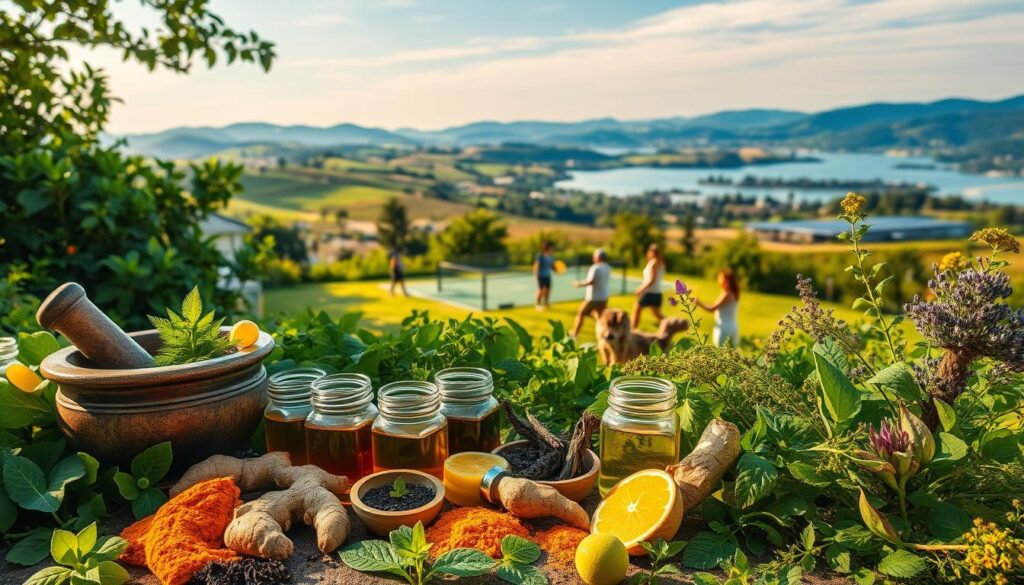
The Power of Bananas and Other Potassium-Rich Foods
Potassium is key for muscle function, especially in contraction. It helps nerves send signals, making muscles work right during exercise. For vegan athletes, getting enough potassium is vital for top performance and muscle health. Eating foods high in potassium can greatly boost an athlete’s nutrition and results.
Why Potassium is Essential for Muscle Function
Muscle contraction needs potassium to send the signals for movement. Having the right amount of potassium keeps muscles tight and stops cramps. Without enough, athletes might feel tired and get cramps, hurting their performance.
Best Plant-Based Sources of Potassium
Many tasty plant-based foods are packed with potassium. Here are some of the best:
- Bananas
- Avocados
- Kidney beans
- Spinach
- Sweet potatoes
- Oranges
Eating these foods can keep potassium levels up for muscle function and health. Regularly eating these foods boosts performance and helps with recovery. They are key for a balanced diet for athletes.
The Benefits of Magnesium for Vegan Athletes
Magnesium is key for vegan athletes, helping with muscle recovery and energy. It supports muscle functions, which boosts athletic performance. Adding magnesium-rich foods to a vegan diet helps meet nutritional needs and aids in recovery.
Magnesium-Rich Foods to Incorporate
Finding magnesium in plant-based foods is important. Here are some top magnesium sources for vegan athletes:
- Nuts (especially almonds and cashews)
- Seeds (such as pumpkin seeds and chia seeds)
- Leafy greens (spinach, Swiss chard, and kale)
- Legumes (black beans, lentils, and chickpeas)
- Whole grains (brown rice, quinoa, and oats)
- Dark chocolate (choose varieties with high cocoa content)
Eating these foods daily boosts magnesium intake. This supports muscle recovery and helps vegan athletes perform better and reach their fitness goals.
Consumption of Anti-Inflammatory Foods
Vegan pickleball players benefit from an anti-inflammatory diet. It helps reduce muscle soreness and boosts performance. Adding vegan spices to meals adds flavor and aids in muscle recovery. The right spices are a natural way to support nutrition for athletes.
Spices that Reduce Muscle Inflammation
Some spices are known for their anti-inflammatory effects. Adding them to meals helps keep muscles healthy and speeds up recovery:
- Turmeric: It has curcumin, a strong anti-inflammatory that helps muscles recover and reduces soreness.
- Ginger: It’s great at easing pain and inflammation, making it easier to feel better after exercise.
- Cinnamon: This spice helps control blood sugar and has anti-inflammatory properties, helping athletes recover.
Using these spices regularly makes meals more flavorful and supports an anti-inflammatory diet. Athletes can improve their performance and recover faster, all while enjoying their food.
Post-Game Nutrition for Muscle Recovery
Post-game nutrition is key for muscle recovery. It helps athletes perform better and stay energized. Eating the right foods after a game speeds up recovery and gets the body ready for the next workout. A good muscle recovery diet includes proteins, healthy fats, and complex carbs.
Balanced Meals to Promote Healing
Recovery meals should have protein like quinoa, lentils, chickpeas, and tofu. These help fix and grow muscles. Complex carbs give back energy. Adding veggies brings important vitamins and minerals.
Timing Your Post-Game Nutrition
When you eat after a game matters a lot. Athletes should eat within 30 to 60 minutes. This helps the body use nutrients best for muscle repair and staying hydrated. Choosing the right foods at the right time can boost performance in future games.
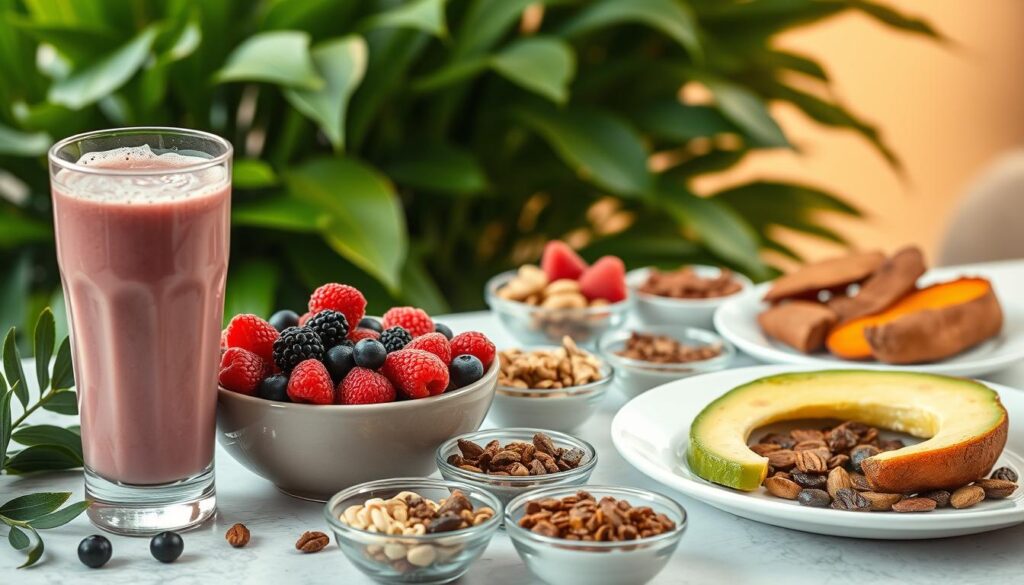
Listening to Your Body: Signs of Dehydration and Cramping
Athletes need to pay close attention to their body’s signals. This helps them perform better and stay safe. Knowing the signs of dehydration and cramping is key to better health.
Signs of dehydration include feeling tired, dizzy, and having a dry mouth. It’s important to notice these signs. They mean your body might not have enough water. Cramping, like muscle tightness or spasms, also shows a problem, like not enough electrolytes or water.
It’s vital for athletes to understand these body signals. Watching for these signs during training and games can really help. By staying hydrated and catching cramping early, athletes can do better and avoid injuries.
Practical Tips for Vegan Pickleball Players to Avoid Cramps
To perform well in vegan pickleball, it’s key to plan meals and stay hydrated. A balanced diet and good hydration can help prevent cramps. Here are some tips to keep you energized and cramp-free during games.
Creating a Balanced Meal Plan
For vegan athletes, a good meal plan is crucial. It should include a variety of nutrients to support muscles and recovery. Make sure to include:
- Whole grains for lasting energy.
- Legumes for protein and fiber.
- Fruits and vegetables for vitamins, minerals, and antioxidants.
- Nuts and seeds for healthy fats and magnesium.
Having nutrient-rich meals before games gives you the energy needed to perform well. It also helps lower the chance of getting cramps.
When to Rehydrate During Matches
Staying hydrated is key to avoiding muscle cramps. Players should:
- Drink water or electrolyte drinks before starting to hydrate well.
- Drink small amounts during breaks to stay hydrated without feeling full.
- Watch for signs of dehydration and adjust your drinking accordingly.
By following these tips, vegan pickleball players can improve their game and avoid cramps.
Potential Risks and Considerations
Pickle juice is popular for muscle cramps, but knowing its downsides is key. It has a lot of sodium, which can raise blood pressure. This is a big concern for people with certain diets. Always use it in moderation to stay safe.
Understanding the Limitations of Pickle Juice and Alternatives
Not everyone should rely only on pickle juice. Your diet and health can affect how well it works. Looking into other natural options is smart. Drinks like coconut water and foods high in magnesium can help muscles without the sodium risks.
| Natural Remedies | Benefits | Risks |
|---|---|---|
| Pickle Juice | Quick relief for muscle cramps | High in sodium, may raise blood pressure |
| Coconut Water | Electrolyte balance, hydrating | Lower sodium than pickle juice |
| Magnesium-Rich Foods | Supports muscle function, reduces spasms | Dietary restrictions may limit sources |
| Electrolyte Drinks | Maintains hydration, replenishes lost nutrients | Artificial ingredients may be present |
Conclusion
Vegan athletes in pickleball can greatly improve with the right anti-cramp strategies. Nutrition and hydration are key to their health. They help athletes perform better and avoid muscle cramps.
Adding essential electrolytes, potassium-rich foods, and magnesium is vital. These elements boost performance and reduce muscle cramps.
Natural remedies like pickle juice and plant-based options offer quick relief. Staying hydrated during practice and games helps athletes fight off muscle cramps.
Vegan athletes can enhance their performance and health by following these tips. It’s important to listen to your body and stay proactive with nutrition and hydration. This approach leads to success on the court.
FAQ
What are some common causes of muscle cramps in pickleball players?
Muscle cramps can happen for many reasons. Not drinking enough water, not getting enough nutrients, and pushing too hard are common causes. Players often get cramps because they don’t eat right or drink enough water.
How can a vegan diet help prevent muscle cramps?
A vegan diet is full of important nutrients like carbs, proteins, and fats. It also has essential electrolytes and micronutrients. These help keep energy up, repair muscles, and improve sports performance, which can prevent cramps.
Is pickle juice an effective remedy for muscle cramps?
Yes, studies show pickle juice can make muscle cramps shorter and less intense. The vinegar in it might stop the cramping.
What are the best plant-based sources of electrolytes for athletes?
Good sources of electrolytes include bananas (potassium), spinach (magnesium), and sea salt (sodium). Eating these can keep your muscles working right and prevent cramps.
How important is hydration for preventing muscle cramps?
Staying hydrated is key for athletes. It helps keep your body cool and moves nutrients around, which lowers the chance of getting cramps during intense activities like pickleball.
What role does potassium play in muscle function?
Potassium is vital for muscle and nerve function. Having enough potassium helps muscles work right and can prevent cramps.
What anti-inflammatory foods can aid in recovery from muscle soreness?
Foods like turmeric, ginger, and cinnamon are anti-inflammatory. Eating them regularly can help with muscle soreness and recovery.
How soon after a game should I consume post-game nutrition?
Eat a meal with proteins and carbs within 30 to 60 minutes after playing. This helps with recovery and reduces soreness.
What are the symptoms of dehydration that athletes should watch for?
Signs of dehydration include thirst, dry mouth, feeling tired, dizzy, and muscle cramps. Athletes should watch for these and drink water to stay hydrated.
Are there any risks associated with consuming pickle juice?
Pickle juice can be good, but only in small amounts because of its high sodium. Athletes should think about their diet and health before drinking it often.


